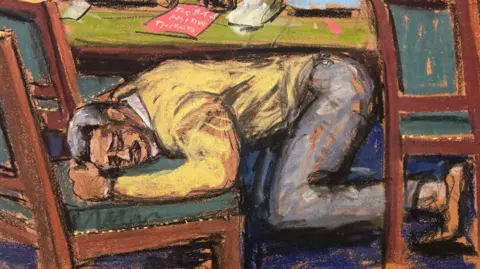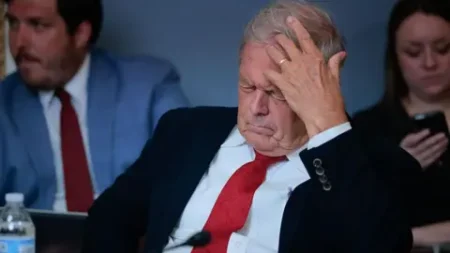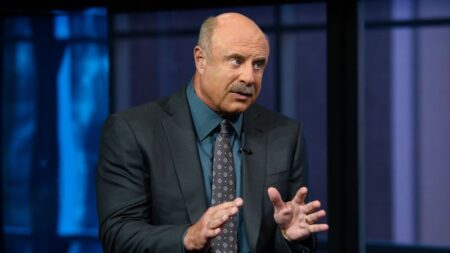In a courtroom filled with silence, the moment arrived that would determine Sean “Diddy” Combs’ fate after a harrowing two-month trial steeped in allegations of sex trafficking and racketeering. On Wednesday morning, July 2, 2025, a jury comprised of twelve individuals delivered its verdict in a New York courtroom, finding the renowned hip-hop mogul not guilty of the most severe accusations leveled against him. This pivotal moment transpired at approximately 10:00 AM (14:00 GMT), directly impacting Combs’ life and career.
Upon hearing the verdict, Combs fell to his knees, a visual representation of the relief and emotion he felt. He deeply buried his head into a chair situated at the defense table, a spot where he had spent countless hours over the course of his trial. Dressed in a simple off-white sweater and matching pants, Combs maintained a stoic appearance just moments before the verdict was declared. As the court grew silent, tension filled the air when the jury foreperson presented the verdict sheet to the court deputy.
The first announcement, the “not guilty” verdict regarding the most serious charge of racketeering, landed heavily in the courtroom. Combs remained hunched over, even as the foreperson continued to read through the verdicts. By the time he was cleared of the charge of sex trafficking, the hip-hop icon had both hands clasped over his head, his worries momentarily lifted from his shoulders.
Following the verdict, Combs experienced an emotional tide. He directed a prayer gesture towards the jury and then turned around to extend the same sign to his family members present in the courtroom. His twin daughters, sons, and 85-year-old mother witnessed the emotional display of gratitude. What remained unsaid but palpable was Combs seemingly mouthing the words, “I’m coming home.” Meanwhile, his legal team, including lawyer Teny Geragos, displayed tears of joy, illustrating the human impact behind this high-profile case.
Despite the jury’s verdict on the major charges, they did find him guilty of lesser offenses related to transporting individuals to engage in prostitution. This partial verdict prompted another wave of emotions, as Combs buried his face in his hands but also signaled gratitude for the not-guilty findings. The decision reached after only two days of deliberation prompted Combs’ attorneys to argue that he should be released immediately. His lawyer, Marc Agnifilo, told the court that the acquittal on serious charges allowed for his client’s freedom, pointing out that Combs’ plane was in Maui and inaccessible at that moment. He added emphatically, “Mr. Combs has been given his life by this jury.”
In a poignant expression of his feelings, Combs leaned his head back into the chair, embodying relief and gratitude. Rising from his seat, he clapped his hands, signifying the end of a tumultuous chapter, and embraced several of his attorneys. Family and supporters in the courthouse, including those who had gathered in a packed overflow room, erupted in applause and cheers.
However, the euphoria was short-lived. After a subsequent hearing later that afternoon, Judge Arun Subramanian denied Combs bail, leaving him in custody until his sentencing is scheduled later in the year, despite the verdict that many believed could have granted him freedom immediately. Outside the courthouse, supporters chanted, “Free Diddy,” as a large crowd formed behind barriers.
This dramatic courtroom saga cast a spotlight on issues surrounding celebrity, justice, and accountability, with the outcome stirring debate among fans and critics alike. The emotional rollercoaster experienced by Combs, his family, and his legal team serves as a reminder of the gravity of legal battles, particularly in high-stakes cases involving public figures. As Combs faces the aftermath of the trial, the overarching narrative will continue to weave through the intricate tapestry of his career, his personal life, and the judicial system in America.











